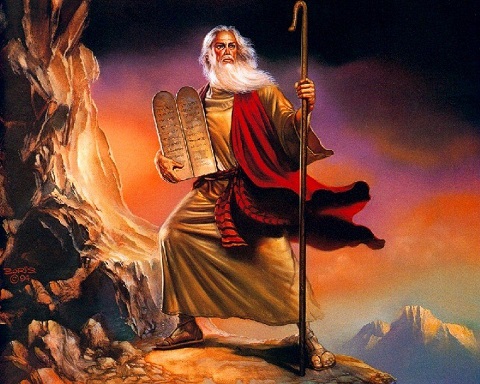The Mahabharata recounts the struggles faced by the childless King Pandu who was without an heir. Rsi Kindama and his wife had taken the forms of deer to make love discreetly. Unfortunately, King Pandu was hunting then and had accidentally shot them. Enraged, Kindama had cursed King Pandu to die the next time he had sex with his wives. King Pandu was thus prevented from begetting any children and heirs to his throne. How to overcome this threat to his dynasty?
King Pandu’s birth was itself a desperate act to solve the same problem the previous generation. The former King, Vichitravirya, had died childless so an heir was needed. Vichitravirya’s mother Satyavati had had a son prior to her marriage to King Shantanu, Vichitravirya’s father. This son, Vyasa, was invited to impregnate Vichitravirya’s widows Ambika and Ambalika. Pandu had been born from the union between Vyasa and Ambalika. King Pandu was thus the biological son of Vyasa but heir to former King Vichitravirya through Niyoga, the practice where a surrogate man could father a child when the husband had died. Great need had called for desperate action.
Now King Pandu was facing the same problem because of the curse placed on him by Kindama. What to do? Once again, desperate action was needed. One of Pandu’s wives, Queen Kunti (or Prtha), knew a secret mantra (revealed in her childhood by Brahmana Durvasa) impregnating her by a deva. So Queen Kunti used this secret mantra to conceive the three elder Pandava brothers: Yudhishthira, Bhima and Arjun. Queen Madri, co-wife of Queen Kunti, obtained this mantra from Kunti, and she gave birth to the younger Pandava brothers Nakula and Sahadeva similarly.
Remaining childless can bring great sadness to couples. It becomes even harder to bear when an heir for the nation is at stake. Whether finding surrogate partners or invoking secret mantras to move devas into action, remaining passive in such a situation is hardly an option.
Rsi Abraham faced the same situation 4000 years ago. The way he solved the problem is treated by the Veda Pusthakan (Bible) as a model so we’d be wise to learn from it.
Abraham’s Complaint
Several years have passed in Abraham’s life since the Promise recorded in Genesis 12 was spoken. Abraham had moved to the Promised Land in what is today Israel in obedience to that promise. Then other events occurred in his life except the very one that he hoped for – the birth of the son through whom this promise would be fulfilled. So we continue the account with Abraham’s complaint:
After this, the word of the LORD came to Abram in a vision:
“Do not be afraid, Abram.
I am your shield,
your very great reward.”
But Abram said, “O Sovereign LORD, what can you give me since I remain childless and the one who will inherit my estate is Eliezer of Damascus?” And Abram said, “You have given me no children; so a servant in my household will be my heir.” (Genesis 15:1-3)
God’s Promise
Abraham had been camping out in the Land awaiting the start of the ‘Great Nation’ that had been promised him. But no son was born and by this time he was around 85 years old, which focused his accusation.
Then the word of the LORD came to him: “This man will not be your heir, but a son coming from your own body will be your heir.” He took him outside and said, “Look up at the heavens and count the stars—if indeed you can count them.” Then he said to him, “So shall your offspring be.” (Genesis 15:4-5)
In their exchange God renewed His Promise by declaring that Abraham would get a son that would become a people as uncountable as the stars in the sky – many for sure, but hard to number.
Abraham’s Response: Like a Puja with Permanent affect
The ball was now back in Abraham’s court. How would he respond to this renewed Promise? What follows is treated by the Bible as one of its most important sentences. It lays the foundation to understand an eternal truth. It says:
Abram believed the LORD, and he credited it to him as righteousness. (Genesis 15:6)
It is easier to understand this sentence if we replace the pronouns with names, to read:
Abram believed the LORD, and the LORD credited it to Abram as righteousness. (Genesis 15:6)
It is such a small and inconspicuous sentence. It comes and goes with no news headline and so we might miss it. But it is truly significant. Why? Because in this little sentence Abraham gets ‘righteousness’. This is like a getting the merits of a puja that will never degrade or be lost. Righteousness is the one – and the only one – quality that we need to get right standing before God.
Reviewing our Problem: Corruption
From God’s point-of-view, though we were made in the image of God something happened that corrupted that image. Now the verdict is that
The LORD looks down from heaven on the sons of men to see if there are any who understand, any who seek God. All have turned aside, they have together become corrupt; there is no one who does good, not even one. (Psalm 14:2-3)
Instinctively we sense this corruption. This is why festivals, such as the Kumbh Mela festival, are so well attended because we sense our sin and our need for cleansing. The Prartha Snana (or Pratasana) mantram also expresses this view that we have about ourselves:
I am a sinner. I am the result of sin. I am born in sin. My soul is under sin. I am the worst of sinners. O Lord who has the beautiful eyes, Save me, O Lord of the Sacrifice.
The result of our corruption is that we find ourselves separated from a Righteous God because we have no righteousness ourselves. Our corruption has seen our negative karma grow – reaping futility and death in its wake. If you doubt that just scan some news headlines and see what people have been up to the last 24 hours. We are separated from the Maker of Life and so the words of Rsi Isaiah of the Veda Pusthakan (Bible) come true
All of us have become like one who is unclean, and all our righteous acts are like filthy rags; we all shrivel up like a leaf, and like the wind our sins sweep us away. (Isaiah 64:6)
Abraham and Righteousness
But here between Abraham and God we find, slipped in so quietly that we can almost miss it, the declaration that Abraham had gained ‘righteousness’ – the kind that God accepts. So what did Abraham ‘do’ to get this righteousness? Once again, so discreet that we are in danger of missing the point, it simply says of Abraham that he ‘believed’. That’s it?! We have this insurmountable problem of sin and corruption and so our natural tendency down the ages is to look for sophisticated and difficult religions, efforts, pujas, ethics, ascetic disciplines, teachings etc. – to gain righteousness. But this man, Abraham, gained that prized righteousness simply by ‘believing’. It was so simple we can almost miss it.
Abraham did not ‘earn’ righteousness; it was ‘credited’ to him. So what is the difference? Well, if something is ‘earned’ you worked for it – you deserve it. It is like receiving wages for the work you do. But when something is credited to you, it is given to you. Like any gift freely given it is not earned or merited, but simply received.
This account of Abraham overturns the common understanding that we have about righteousness either by thinking that it comes from a belief in God’s existence, or that righteousness is obtained by doing sufficiently good or religious activities. This is not the way Abraham took. He simply chose to believe the promise extended to him, and then he was credited, or given, righteousness.
The rest of the Bible treats this encounter as a Sign for us. Abraham’s belief in the promise from God, and the resulting credit of righteousness, is a pattern for us to follow. The whole of the Gospel is founded on promises that God gives to each and every one of us.
But then who pays for or earns righteousness? We take it up next.




Hello,
This Prarthana Snana mantram that you speak of: Do you have the exact quotation from where in the vedas, upanishads or Puranas it has been taken? I have seen it being quoted but no one ever has mentioned where it came from.
Thanks
That is a good question. My source for the Prarthana snana mantram (since I do not read sanskrit) is the book “Christ in the Ancient Vedas”. On pg 51 he writes “a well known prayer of Hindus before the morning bath” and there is no veda reference. The sanskrit transliteration is
Papoham papakarmoham
Papatma papasaambhavah
Matsamo papaki nasti
Trahimam pundarikasha
Sarvayajnesvaro harih
Well. I thought as well that you might not have the exact quote. I’ll ask the source he has quoted it many times on his DVDs and Youtube videos. Keep up the good work.
I am planning on a similar website here, on similar topics with actual quotes from the Hindu scriptures. Will get in touch with you about different steps.